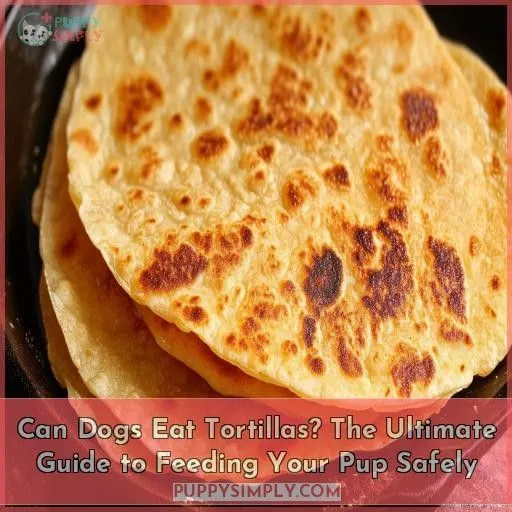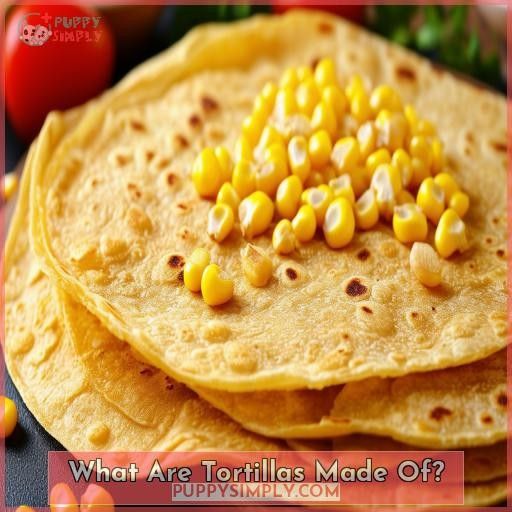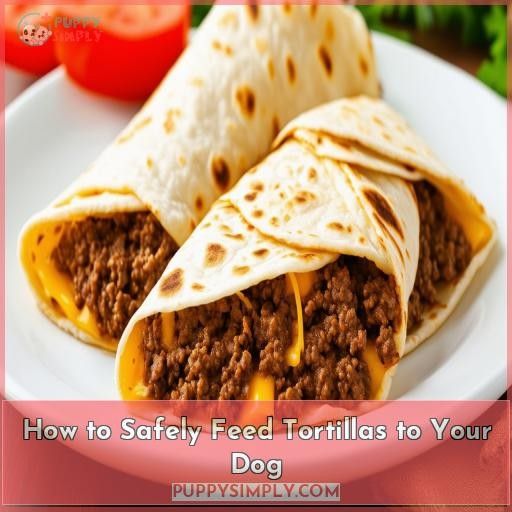This site is supported by our readers. We may earn a commission, at no cost to you, if you purchase through links.
 Plain corn or flour tortillas provide carbohydrates and can add variety to your pup’s diet. However, you’ll want to practice portion control since tortillas are high in sodium and refined carbs, which could lead to weight gain or digestive issues if overfed.
Plain corn or flour tortillas provide carbohydrates and can add variety to your pup’s diet. However, you’ll want to practice portion control since tortillas are high in sodium and refined carbs, which could lead to weight gain or digestive issues if overfed.
Avoid seasoned tortillas or toppings that may contain harmful ingredients. Introduce tortillas gradually and monitor your dog’s reaction.
For frequent, low-calorie rewards during training, break tortillas into small pieces.
Want to confirm you’re feeding your furry friend safely? Keep reading to learn more.
Table Of Contents
Key Takeaways
- Tortillas, whether corn or flour, can add some tasty variety to your furry friend’s diet, but their high sodium and refined carb content mean you’ll need to keep portions in check. Just imagine Fido going to town on a pile of tortillas – not the healthiest scenario!
- While tortillas aren’t outright toxic, introducing them gradually is crucial. Fido’s tummy may not take kindly to a sudden tortilla binge, leading to digestive drama worthy of an Oscar.
- For low-calorie training rewards, break those tortillas into bite-sized pieces. Imagine Fido’s delight as he earns those crunchy, portion-controlled morsels through his impressive tricks!
- Always steer clear of seasonings and toppings that could spell trouble for your pup’s health. A plain tortilla is already a treat – no need to gild the lily and risk an upset stomach or worse.
What Are Tortillas Made Of?
Tortillas are flatbreads made primarily from masa harina (dried corn treated with lime), water, and salt. They provide carbohydrates, a small amount of protein, and some essential vitamins and minerals, though their nutritional profile varies depending on the specific ingredients used.
Ingredients in Tortillas
You’ll find that tortillas are typically made from masa harina (dried corn flour), water, salt, and sometimes vegetable shortening or oil.
While they’re naturally gluten-free, those with corn allergies should avoid them.
Flour tortillas contain wheat flour, water, fat, and salt, so they’re higher in carbs and calories than Corn tortillas.
When feeding tortillas to your dog, be mindful of their potential dietary supplements.
Nutritional Value of Tortillas
Regarding the nutritional value of tortillas, they provide ample carbohydrates but are deficient in certain essential nutrients.
A single corn tortilla offers approximately 12g of carbs, 1g of fiber, and minimal protein or vitamins.
Flour tortillas, on the other hand, are higher in calories and carbohydrates.
Therefore, while tortillas can be incorporated in moderation, it’s advisable to maintain a reasonable serving size.
Can Dogs Eat Tortillas Safely?
While tortillas are generally not toxic to dogs, they can present some potential health risks if consumed in large quantities. The high carbohydrate content and difficulty in digesting certain ingredients like flour and oils may lead to gastrointestinal issues like vomiting, diarrhea, or pancreatitis in dogs.
Potential Health Risks of Feeding Tortillas to Dogs
While tortillas may seem harmless, you should be cautious about feeding them to your pup. The high sodium content can lead to health issues like dehydration and salt toxicity. Additionally, potential allergies to wheat or gluten intolerance could trigger adverse reactions. Excessive refined carbohydrates from tortillas could also contribute to weight gain and related problems.
Digestibility of Tortillas for Dogs
While tortillas provide carbs, they’re low in fiber, making them difficult for dogs to digest fully. If your pup has gluten or corn sensitivities, tortillas could trigger gastrointestinal issues. Additionally, their empty calories and lack of nutritional value mean you’ll need to monitor portion sizes carefully to avoid weight gain.
Potential Benefits of Feeding Tortillas to Dogs
One potential benefit of feeding tortillas to your dog is that it can provide variety in their diet, helping to prevent food boredom. Additionally, plain tortillas can make an excellent, low-calorie training treat when broken into small pieces, allowing you to reward your pup frequently during training sessions.
Providing Variety in Your Dog’s Diet
You can spice up your pup’s meals by occasionally indulging them with homemade tortilla treats. Baking plain tortillas yourself guarantees they’re free from potential grain allergies and harmful additives. This occasional indulgence provides variety in their diet, keeping mealtime engaging while allowing you to monitor their intake.
Using Tortillas as Training Treats
Tortillas can double as handy training treats, offering a few key benefits:
- They add variety to your pup’s diet, preventing boredom
- Their texture may appeal to dogs who prefer crunchy treats
- You can break them into bite-sized pieces for portion control
- They’re ideal for frequent, low-calorie rewards during training sessions
Just be mindful of any toppings or seasonings that could harm your furry friend.
How to Safely Feed Tortillas to Your Dog
When introducing tortillas to your dog’s diet, portion control is paramount to prevent obesity and digestive issues. Avoid adding toppings or seasonings that could be harmful, and gradually introduce small amounts of plain tortillas to allow your dog’s system to adjust.
Portion Control
While tortillas offer some benefits, it’s essential to practice portion control.
Overeating can lead to digestive upset and weight gain. Monitor your dog’s calorie intake and feed tortillas in moderation as an occasional treat.
Excessive consumption may also spike blood sugar levels and contribute to dental issues from starchy residues.
Start with small quantities, and adjust based on your dog’s size and activity level.
Avoiding Toppings and Seasonings
You’ll also want to avoid toppings and seasonings when feeding tortillas to your pup. Many popular toppings like cheese, sour cream, and salsa can cause stomach upset or contain ingredients toxic to dogs. The same goes for seasonings like garlic, onion, or excessive salt and sugar that may trigger allergy concerns or choking hazards.
Introducing Tortillas Gradually
You’ll want to introduce tortillas gradually to monitor for potential allergies or digestive upset. Start with a small portion, observing your pup closely. If all goes well, you can increase the amount over time while still monitoring portions carefully. Used in moderation, tortillas can provide variety and a handy training aid without compromising your dog’s overall nutritional intake.
Alternative Healthy Treats for Dogs
While tortillas may provide some variety in your dog’s diet, it’s best to stick with healthier alternatives like dog-friendly fruits and vegetables or commercial treats specifically formulated for canine nutrition. These options offer more balanced nutrients and fewer potential risks compared to human foods like tortillas.
Dog-Friendly Fruits and Vegetables
You can treat your pup to some dog-friendly fruits and veggies for a healthy snack. Consider these tasty options:
- Carrots – full of fiber and vitamin A
- Apples – a crunchy, vitamin C-packed treat (remove seeds)
- Green beans – low-calorie and high in vitamins
Just remember, moderation is key. Fruits and veggies make great occasional treats but shouldn’t replace your dog’s balanced diet.
Commercial Dog Treats
Commercial dog treats offer convenience, but scrutinize labels for allergies, preservatives, artificial flavors, sugar, and salt. Seek high-quality, vet-approved treats with wholesome ingredients like meat, fruits, and veggies. Moderation is key, as overindulging can lead to weight gain and health issues. With diligence, you can find tasty, nutritious treats that excite your pup.
Frequently Asked Questions (FAQs)
Are tortillas safe for puppies and senior dogs?
You’re wise to ask – puppies and seniors have delicate digestions. While plain tortillas aren’t toxic, they’re calorie-dense and low in nutrients. Moderation is key to avoid gut issues and unwanted weight gain for your furry friends.
Can tortillas trigger food allergies in dogs?
Yes, tortillas can trigger food allergies in dogs. While rare, some pups have sensitivities to ingredients like corn, wheat, or preservatives. If your dog experiences vomiting, diarrhea, or itching after eating tortillas, discontinue and consult your vet.
How many tortillas are too many for dogs?
Like a kid with Halloween candy, Fido may want to gobble every tortilla in sight. But going overboard can lead to an upset tummy. Two or three small tortillas max is usually a safe bet for your furry friend.
Can tortillas cause digestive issues in dogs?
Yes, tortillas can cause digestive issues in dogs, especially in large quantities. The high carb content and potential ingredients like garlic or onions can upset their stomachs, leading to vomiting or diarrhea. It’s best to limit tortilla treats and monitor their reaction.
Are whole wheat tortillas better for dogs?
One in four dogs suffers from wheat allergies. While whole wheat tortillas have some fiber, their gluten content can trigger digestive issues in sensitive pups. For Fido’s sake, opt for corn or other gluten-free varieties.
Conclusion
As a caring pet owner, you navigate a path strewn with potential pitfalls and pleasant surprises.
When exploring if dogs can eat tortillas, proceed with caution – moderation is key. Tortillas can add variety but also risks like sodium overload.
Introduce them slowly, monitoring reactions. With prudence, you can safely integrate this occasional treat into your pup’s diet, fostering a strong bond through shared delights.











